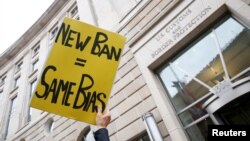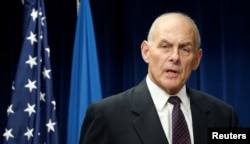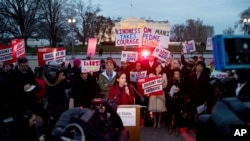Iraq, now removed from U.S. travel restrictions, praised the new executive order President Donald Trump signed Monday, while Sudan, still included in the ban, reaffirmed its opposition to the measure.
Iraqi Foreign Ministry spokesman Ahmed Jamal, in comments to the Associated Press, said the revised U.S. order removing Iraq from the ban list will "enhance" U.S.-Iraqi cooperation in the fight against Islamic State extremists.
Secretary of State Rex Tillerson said Iraq's removal followed a State Department review on improving vetting of Iraqi citizens in collaboration with the Iraqi government.
The order's 90-day ban on the issuance of new visas applies now to citizens of six majority-Muslim countries — Iran, Syria, Yemen, Libya, Somalia and Sudan.
African leaders express disappointment
The Sudanese foreign ministry issued a statement Tuesday expressing regret and disappointment at Trump's order.
"Khartoum is furious because it is involved in a process that was supposed to lead to all U.S. sanctions being lifted," said Mohamed Naji, managing editor of the Sudan Tribune news website in Paris. "This long negotiation began under President George W. Bush. ... In this context, Khartoum is wondering if there has been a setback in the process, especially given that President Trump's executive order lists Sudan among states sponsoring terrorism."
In Nigeria, the government released a travel advisory suggesting people to postpone any plans to go to the United States until the Trump administration's immigration policy is clear.
Abike Dabiri-Erewa, senior special assistant on foreign affairs and diaspora to Nigerian President Muhammadu Buhari, said the advisory is about telling people to be cautious.
"Just in the last few weeks, we had a few cases of people that were sent back from the airport, basically visitors coming into America, sent back from the airport to their country," he said. "So we are saying that if your trip is not that essential, maybe you should just watch and see."
Republicans laud ban, Democrats criticize
Back in the United States, several key congressional Republicans congratulated the Trump administration for its revisions to the order, while a leading Democrat and several human rights organizations sharply criticized it as "racist and anti-Islamic."
The split had House Speaker Paul Ryan praising the new order, saying it advances "our shared goal" of protecting the United States. Republican Senator Lindsey Graham said he believes the new directive, unlike the earlier order, will not be seen as a religious ban and will pass legal scrutiny. The previous executive order was suspended following legal challenges and the revised version was aimed at overcoming those objections.
Graham said he believed the new order to be "a ban on individuals coming from compromised governments and failed states."
Democratic Senator Bernie Sanders voiced sharp disagreement with his Republican colleagues, describing the new ban as singling out Muslims in "an attempt to divide us up."
"This isn't about keeping America safe," Sanders said."A president who respected our traditions of religious freedom would not have resorted to hateful, anti-Islamic rhetoric to justify [the] ban."
Refugee organization calls ban 'gift for extremists'
The International Rescue Committee, which provides humanitarian aid to 40 countries and resettles vetted refugees in 28 U.S. cities, described the new order as a threat to 60,000 already-vetted refugees left stranded in crisis zones.
"This ban doesn't target those who are the greatest security risk, but those least able to advocate for themselves," the IRC said in a statement. "Instead of making us safer, it serves as a gift for extremists who seek to undermine America."
The IRC also touted the U.S. resettlement program, saying it is regarded as "the world's most successful and secure." It said there has not been a deadly terrorist attack by a refugee since the U.S. resettlement program was launched in 1980.
Amnesty International described Trump's replacement order as "the same hate and fear with new packaging." An Amnesty statement also warned that the order will generate "extreme fear ... for thousands of families by, once again, putting anti-Muslim hatred into policy."







